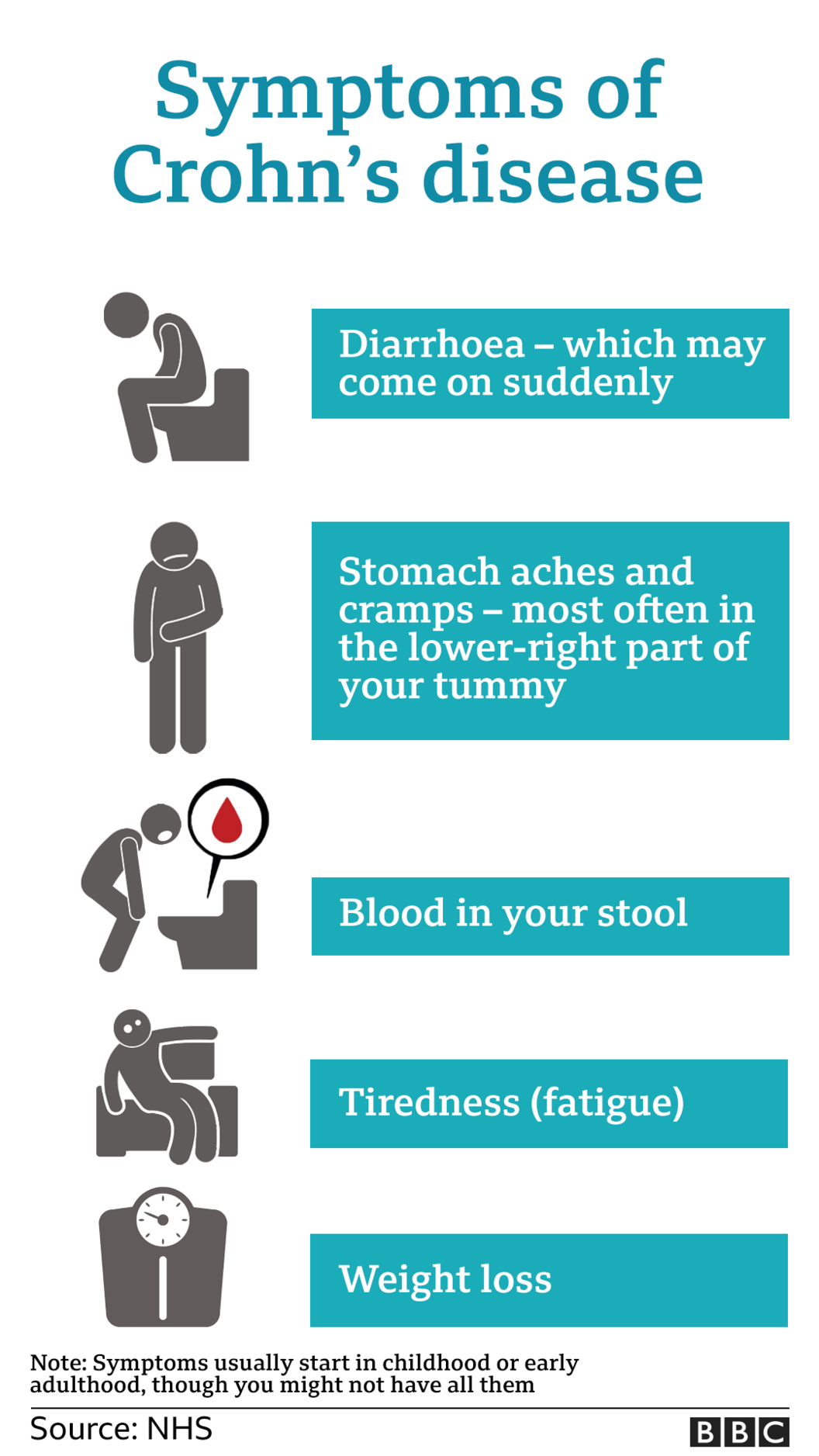Crohn's disease: 'I lived on bran flakes and sweets for a year'
- Published

Stand-up comic Sianny Thomas didn't eat properly for a year because of Crohn's disease
A stand-up comedian survived on Haribo sweets and bran flakes for a year because of digestive problems.
Sianny Thomas lived on the unusual diet in a bid to control symptoms of Crohn's disease before she was diagnosed.
The 36-year-old from Swansea is urging young people with digestive problems to use an online symptom checker.
Charity Crohn's & Colitis UK warned that delaying treatment can leave people needing stronger medication.
Ulcerative Colitis and Crohn's disease, both forms of inflammatory bowel disease (IBD), cause the immune system to go into overdrive and attack healthy tissue in the gut.
Most patients first visit their GP with stomach pain, diarrhoea, weight loss or blood in their poo. The condition is lifelong and there is no known cure.
A new survey suggested nearly a fifth of people in Wales would avoid visiting the doctor because they were frightened - but this in turn could lead to a later diagnosis.
Consultant Nurse Isobel Mason warned treatment becomes more difficult if the signs of Crohn's are ignored for too long. "You are more likely to need stronger medication, hospital admissions or surgery," she said.
'Brown toast was agony'
Ms Thomas said she ate the sweets because they were the only thing she could eat without pain.
"My relationship with food was bad because I didn't want to eat, because it hurt," Ms Thomas said.

She said it took almost three years to be diagnosed correctly
Aged 20, she had persistent diarrhoea and went to see her GP who thought she had irritable bowel syndrome (IBS), a common condition affecting the digestive system.
The GP prescribed Imodium and Co-codamol to help with the abdominal pain.
The pain got so bad she was admitted to hospital but did not get a correct diagnosis.
Instead, she was referred to a nutritionist who prescribed bran flakes which would help her body absorb water. But she was still in pain.
"If I ate sweets it wouldn't hurt very much. If I ate brown toast I'd be in agony because my body wasn't ready to work that hard," Ms Thomas said.
"So I basically lived on bran-flakes, sweets, painkillers and Imodium."
"I lost three stone, my eyes became sunken with dark circles and my hair and nails went really dull," she said. "I just wasn't nourished at all."
Following a colonoscopy she was finally diagnosed with Crohn's disease, nearly three years after first going to the GP.
'80% of disabilities are invisible'
Steroids helped her to gain weight in the months that followed and she found solidarity on online forums for Crohn's disease patients.
She started performing stand-up comedy five and a half years ago in an effort to help others.

Sianny Thomas started doing stand-up to raise awareness of conditions like Crohn's
"I need people to learn that 80% of disabilities are invisible," she said. "I need any people in the audience who have IBS or IBD to not feel alone."
Another patient, Natalie-Amber Freegard, from Swindon, said her Crohn's was so bad even Evian water would make her sick. At one point during her seven-year wait for a diagnosis she only ate jelly.
Along with Ms Thomas, she is trying to encourage others to seek help sooner.
'I was living on sugar-free jelly'
"Everything I was eating wasn't working... Evian with a touch of fruit was killing me - I would throw up," the 30-year-old said.
"I was living on sugar-free jelly at one point, and even that would hurt."

Crohn's disease patients are often treated with medicines to reduce inflammation and allow damaged tissue to heal.
"If I'd been diagnosed earlier, I needn't have had such strong medication, nor developed a bad relationship with food," Ms Thomas said.
Following her diagnosis with Crohn's disease, she took an immunosuppressant drug for ten years which kept her condition under control, barring the occasional flare-up.
But the drug left her feeling in a constant state of "malaise", she says. "Every day was like the first day before coming down with a cold."
"But it did do its job," she says, adding she was never hospitalised during this period.
In January 2020 she started taking a new immunosuppressant drug that targets just the bowel and brain, which has improved things significantly.

Sianny is urging young people with digestive problems to use an online symptom checker
There are still some risks associated with the drug, but currently the benefits outweigh the risks for Ms Thomas.
"I feel much more well," she says, although stress can still be a trigger.
"If I have awful, devastating news, I immediately get diarrhoea," she said.
"It's quite fascinating how much hold stress has on chronic illnesses. It's a very common enemy of ours."

HAYLEY PEARCE PODCAST: Tackling the issues that make the group chats go off
SAM SMITH PRESENTS STORIES OF HIV: From Terrence Higgins to today

Related topics
- Published8 September 2019

- Published16 April 2019
